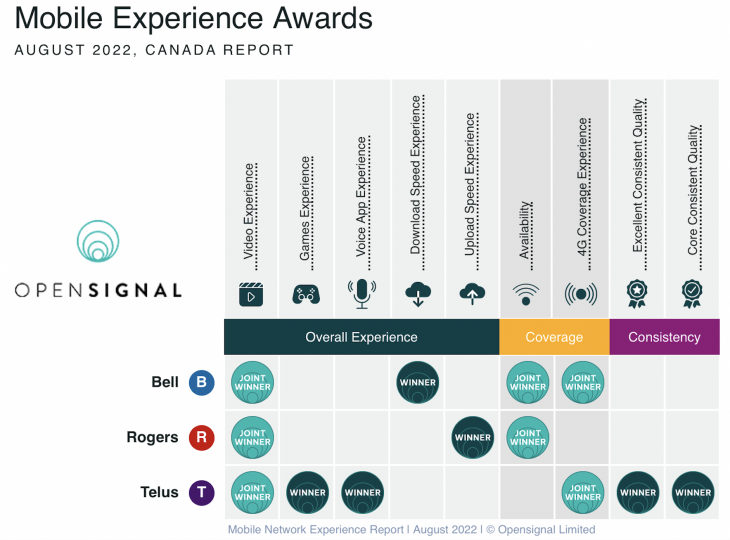
Rogers wins for upload speed experience, Bell wins for download speed experience
LONDON, U.K. – Opensignal, a U.K.-based mobile analytics company has released two new reports on mobile experience in Canada – its Mobile Network Experience Report and its 5G Experience Report, both authored by technical analyst Hardik Khatri and based on data collected from April 1 to June 29, 2022.
Telus has the most consistent mobile network experience in the country, according to the Mobile Network Experience Report, which provides an analysis of the overall experience of Opensignal users across all network technologies for the three national carriers.
The analytics company has two measures for consistency – excellent and core. “Consistent quality quantifies how often users’ network experience was sufficient to support typical applications’ requirements,” according to the report. “Excellent Consistent quality uses thresholds for more demanding applications than Core Consistent Quality.” (Opensignal’s consistency awards are new to its reports.)
Telus won in both categories (please see chart above) with a score of 81.3% for excellent consistent quality (compared to Bell’s score of 80.2 and Rogers’ score of 77.8) and a score of 91.1% for core consistent quality (compared to Bell’s score of 89.1 and Rogers’ score of 87.4).
Telus also won in the games experience category “with a lead of 1.9-2.3 points over Bell and Rogers” and in the voice app experience category, although “it was a very tight race, with just 1.1-1.5 points (out of 100) separating all three operators,” Opensignal’s report says.
Rogers won Opensignal’s upload speed experience award with average speeds of 10.7 Mbps (compared to Telus at 10.3 Mbps and Bell at 10.1 Mbps).
Bell won the download speed experience award with an average speed of 69.5 Mbps, beating out Telus, which was previously the dominant operator in this category, the report says. Telus had an average download speed of 67.9 Mbps, according to today’s report, while Rogers had an average download speed of 53.4 Mbps.
In the category of 4G coverage experience, Bell and Telus both won with identical scores of 9.7 on a 10-point scale while Rogers scored 8.8. “Opensignal’s 4G Coverage Experience analyzes the locations where customers of a network operator received a 4G signal relative to the locations visited by users of all network operators,” the report says.
In Opensignal’s 5G Experience Report, of the three national carriers, Bell and Telus were joint winners in the 5G download speed category “with statistically tied scores just over the 135 Mbps mark.” Opensignal notes the margin of victory in this category “is substantial as the average 5G download speeds of our Bell and Telus users was 38.6-39.1% faster than the speeds seen by Rogers users (98.1 Mbps).”
Telus also ranked first in the 5G video experience category with a score of 77.7 points. Bell’s score was less than a point behind, earning it an “Excellent” rating along with Telus while Rogers’ score was 73.8 points, earning it a rating of “Very Good”.
Rogers, however, won in the 5G reach, 5G availability (see chart below) and 5G games experience categories.
“Our Rogers users spent 13.3% of the time with an active 5G connection compared with 11.4-11.9% 5G Availability seen by Telus and Bell users,” the report explains. “Rogers also wins 5G Reach outright with a score of 5.2 on a 10 point scale, just ahead of Bell and Telus’ scores in the 4.8-4.9 point range. 5G Reach represents the proportion of locations a 5G user visits that have a 5G signal.”
For 5G games experience, Rogers “scored 78.3 points on a 100-point scale, 2.1 points ahead of Telus, which places second with 76.2 points,” the report says. These scores place Rogers and Telus in the “Good” category. Bell fell in the “Fair” category with a score of 74 points.

Charts supplied by Opensignal.



